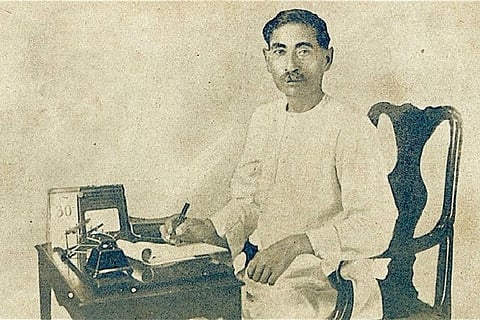

Munshi Premchand (1880 -1936) needs no introduction to the world of arts and book lovers. The literary genius called the "Shakespeare of India" had once influenced a large part of Indian thinking. South India, though far away from him and his writings, could not be left behind. Many of his short stories and novels have been translated into all the south Indian languages. Premchand’s ideas and politics have played a major role in shaping public thought. As the country celebrates yet another birth anniversary of his, we take a close look at how Premchand entered the south Indian psyche.
Premchand wrote the Urdu short story "Bazaar-e-Husn" in 1918. It was published in Hindi as "Seva Sadan" and again published in Urdu in Lahore in 1924. It was translated into Tamil by a famous social worker Ambujammmal, the daughter of Srimaan Srinivasa Iyengar. The magazine Ananda Vikatan that was launched in 1928 was at the peak of its journalistic fame in the 1930s. Headed by S S Vasan and supported by writers like Kalki Krishnamurthy and T Sadasivam who was working as the advertising manager, the magazine was flourishing and made great profits. It was also actively involved in the nationalist movement. The entire story of Seva Sadan was serialized in Ananda Vikatan.
Director K Subramanyam who was highly impressed with this story decided to buy the filming rights for it. Subramanyam is said to have purchased it for a princely sum of four thousand rupees. Sadashivam who was dealing with this contract said he would bankroll fifty percent of the cost of the film if the director agreed to cast the heroine he suggested. The heroine was none other than Madurai Shanmugavadivu Subbulakshmi, or as the world would know later the great Bharat Ratna M S Subbulakshmi or MSS.
M S Subbulakshmi in Seva Sadan
However it was not that easy to shoot. When Sadashivam had signed the contract with film director Subramanyam, MSS’s mother strictly opposed it. She packed her bags and returned to Madurai. After six months it was MSS who had the courage to run away from home and board a train back to Madras. The shooting of the film began after she returned to Madras.
The story of "Seva Sadan" was about a poor young girl who wants to become a singer and becomes the second wife of an old Brahmin man. The man has a shaven-headed widowed sister who is the villain of the story. The girl finds a Good Samaritan who helps her in becoming a singer. The husband comes and seeks pardon. For the role of the widowed sister, director Subramanyam cast a real-life shaven-headed widowed Brahmin woman. The famous stage and screen actor F G Natesha Iyer played the role of the old man and Subbulakshmi plays the role of the young girl.
A scene from "Seva Sadan"
The film created a stir in certain sections of conservative Tamil society, especially among Brahmins. Towards the end of the film is a scene where the hero Natesha Iyer cuts his sacred thread in remorse and seeks pardon. All these were revolutionary in their time and questioned societal norms and worked for social reform. No copy of the film exists unfortunately. The film is remembered as the debut film of M S Subbulakshmi and a seminal way in which literature was converted to cinema. Whatever it is, the film introduced the powerful writing of Premchand to south Indian book and film lovers alike.
Premchand wrote the short story "Kafan" and it was first published in 1936, the year he died. This was later translated into Telugu as "Oka Oori Katha" and adapted to screen by Mrinal Sen in 1977. The basic outline of the story is of a low-caste father Venkayya and his son Kishtayya who are poor labourers in a village. Kishtayya marries Neelamma against his father’s wishes. An emergency occurs when the son's wife dies while giving birth to a child and the family has no money to cremate the body of the dead woman. The lazy duo go around the village asking for money from the zamindar and others. However, they use the money they get on liquor and food instead. The film was a reflection of the social evils of drinking among economically challenged sections of the society.
Director Mrinal Sen during the shooting of "Oka Oori Katha"
The film was shot in the Telangana region. The lead roles of Venkayya the father and Kishtayya the son were played by Vasudeva Rao and Narayana Rao respectively. Daughter of the legendary dancers Uday Shankar and Amala Shankar, Mamata Shankar played the role of Neelamma. The film had a musical score by the Hindustani flute genius of Andhra Pt Vijaya Raghava Rao. The film went on to win several prestigious awards including the National Award for the best film in 1977. It also won the special jury award at the Karlovy Vary International Film Festival.
Mamata Shankar in Oka Oori Katha
Several other stories of Munshi Premchand have been translated and are available in south Indian languages. The social themes he deals with reflect the reality of an India as seen from the perspective of the oppressed. Many of them make sense even to this day. As we arrive at yet another birth anniversary of this great writer, it might never be too late to re-read his stories , novels and writings once again!
Images: Shekhar PC, Selva Kumar, Niharika S.
(Veejay Sai is an award-winning writer, editor and a culture critic. He writes extensively on Indian performing arts, cultural history, food and philosophy. He lives in New Delhi and can be reached at vs.veejaysai@gmail.com)
Also read: